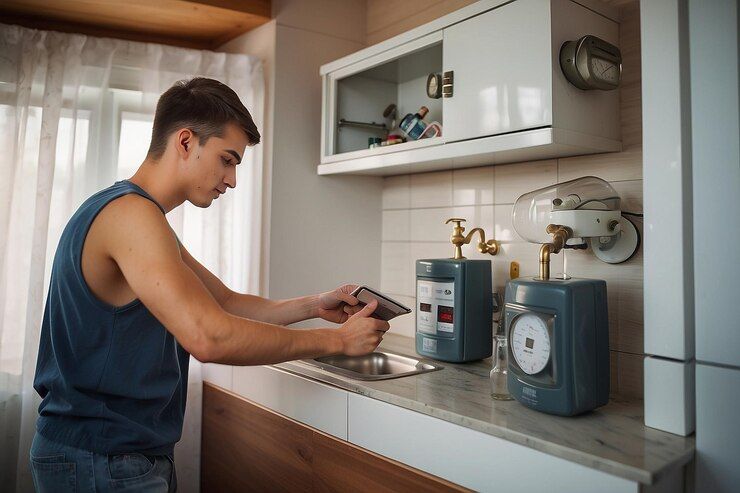Electric boilers are heating systems that use current instead of fossil fuels such as gas or oil. Although not new technologies, their adoption has increased due to increasing pressure for cleaner energy solutions in recent years. Governments all over the world put ambitious climate goals, looking for alternatives that interact home and industries with environmental goals.
Away from traditional boilers are step associated with widespread concerns about carbon emissions, air pollution and energy efficiency. Since electric networks are quickly integrated into renewable energy sources such as wind and solar energy, electric boilers become a natural fit to achieve permanent heating.

Importance
The emergence of electric boilers is important for several reasons:
Environmental effects: They make no direct emissions at the point of use, which reduces the dependence on fossil fuels.
Politics device: Many governments discourage gas heating in new buildings, making electrical systems a long -term solution.
Consumer benefits: Although electricity can be expensive than gas in some areas, electric boilers are usually easy to install, which requires little maintenance and well integrated with renewable power systems.
Industrial application: Beyond home, electric boilers get traction in industries that require steam for procedures, but want to cut emissions.
This change affects homeowners, companies, production companies and decision makers equally. It also addresses the challenge for balancing energy requirements with climate obligations.
Newer updates
Over the past year, many changes have affected the growth of electric boilers:
Energy price ups and downs (2024-2025): In Europe and Asia, the rising prices of natural gas have become more attractive.
Renewable integration: Countries such as Germany and the United Kingdom reported record renewable power generation in 2024, making electric heating more durable.
Technology Reforms: New electric boilers now provide high efficiency and are designed for both small apartments and large industrial functions.
Global adoption trends: In 2024, the EU stated that electric boilers are responsible for the increasing proportion of new heating system installations in residential buildings.
A simplified comparison appears below:
| Aspect | Gas Boilers | Electric Boilers |
|---|---|---|
| Direct Emissions | High | Zero |
| Maintenance Needs | Moderate | Low |
| Energy Source Dependence | Fossil fuels | Grid electricity |
| Policy Support | Declining | Increasing |
Laws or guidelines
Politics is the strongest driver of the electric boiler market in 2025. Many governments present rules that either prohibit fossil fuel heating or encourage electrical alternatives:
EU: The Green Agreement for the EU is aimed at carbonic extermination by 2050. Several members are phasing new gas boiler installations by the mid -2010s.
The UK: Since 2025, the gas boiler is no longer allowed in new residential buildings, and pushes developers against electrical and heat pump systems.
USA: Incentives under the Inflation Reduction Act (IRA) include exemption from families who switch to electric heating. Some states, such as New York and California, offer strict building codes that limit gas use.
The Asia Pacific: Countries such as Japan and South Korea promote electrification in heating as part of their net-zero obligations.
Global carbon pricing: Carbon taxes in some areas make gas -powered systems more expensive, indirectly promoted electric boilers.
These measures create both regulatory pressure and financial incentives for individuals and companies to use electrical heating solutions.
Tools and resources
For those who are considering electric boilers, different types of equipment and resources are available to help decisions:
Energy cost calculator:
Government Energy comparison equipment (eg US Department of Energy, UK OFGEM calculator).
Online carbon footprint calculator to estimate emission savings.
Building and energy code:
Local websites for housing authorities often publish updated building rules for the heating system.
The EU's energy performance provides the standard for effective EU systems of the building instructions (EPBD).
Education Forum:
International Energy Agency (IEA) reports on the trend of electrification.
National resources for renewable energy (NREL) on pure heat.
Support Program:
Discounts plans for homes switching on electric heating.
Industry -specific supplements for factories that modernize boiler systems.
These units help both homeowners and companies evaluate costs, efficiency and compliance with guidelines.
question to ask
Q1: Are electric boilers more expensive than gas boilers?
Electricity is often animals per unit compared to gas, but electric boilers are very effective, usually about 100% efficiency. The actual running cost depends on local energy prices and customs structures.
Q2: Can electric boilers be used for large buildings or industries?
Yes. While he was once seen as a housing solution, the new industrial scale can provide steam and heating with high capacity for the production of electric boilers, health services and commercial facilities.
Q3: How do the guidelines affect the owners of the house who choose a heating system?
Guidelines Form Installation costs, qualification for discount and code requirements. For example, in the UK, new houses built after 2025 should use electric or renewable heating solutions.
Q4: What is the life of an electric boiler?
On average, electric boilers last for 15-20 years with proper maintenance. Their simple design means reduced risk of breaking up compared to low moving parts and gas systems.
Q5: How do electric boilers support renewable energy consumption?
They can be powered by renewable current from the grid directly or from solar panels on site, reducing the dependence on fossil fuels. This makes them an important part of disruption.
Final thoughts
The emergence of electric boilers in 2025 is not only a matter of technology, but also the guidelines. Governments use laws, construction codes and incentives to intensify changes from fossil fuel heating. For household owners, this means new alternatives in the heating system; For industries, it represents the opportunity to modernize operations and match stability goals.
Electric boilers alone cannot solve global warming challenge, but are supported by guidelines and cleaner L.
